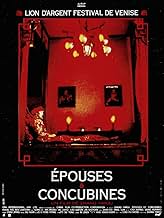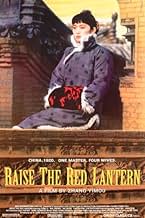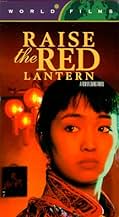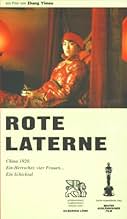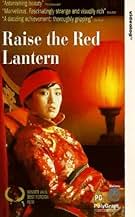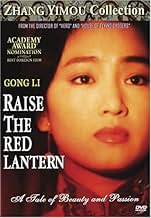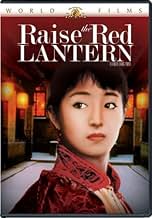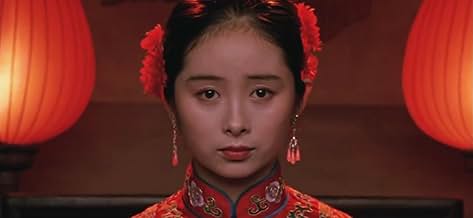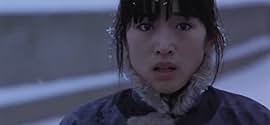CALIFICACIÓN DE IMDb
8.1/10
37 k
TU CALIFICACIÓN
Una mujer joven se convierte en la cuarta esposa de un señor rico, y debe aprender a vivir con las estrictas reglas y tensiónes dentro del hogar.Una mujer joven se convierte en la cuarta esposa de un señor rico, y debe aprender a vivir con las estrictas reglas y tensiónes dentro del hogar.Una mujer joven se convierte en la cuarta esposa de un señor rico, y debe aprender a vivir con las estrictas reglas y tensiónes dentro del hogar.
- Nominado a 1 premio Óscar
- 23 premios ganados y 15 nominaciones en total
Zengyin Cao
- Old Servant
- (as Zhengyin Cao)
Zhigang Cui
- Dr. Gao
- (as Zhihgang Cui)
Espérance Pham Thai Lan
- Kids - Concubines
- (sin créditos)
- Dirección
- Guionistas
- Todo el elenco y el equipo
- Producción, taquilla y más en IMDbPro
Opiniones destacadas
Zhang Yimou solidifies his standing as one of cinema's most brilliant craftsmen with Raise the Red Lantern, a heartbreaking and fascinating look into the life of a young, well-educated woman who gives up her future to become the fourth wife of a wealthy landowner in 1920s China. Gong Li, the director's longtime muse, delivers a performance nearly unsurpassed by anyone, male or female, in the 1990s (and many other decades, as well). Her opening close-up is an indelible image of sorrow and resignation capable of drawing tears out of a statue. Zhang Yimou makes films as exquisitely composed as any master's painting, and his palette extends beyond the obvious beauty of Gong Li to include the details of the courtyards, lanterns, silks, and rooftops with an inexplicable mixture of tranquility and austerity.
10jonr-3
My interest was maintained throughout every minute of this rather long film. I don't remember when I've seen another film in which every single role was played to perfection. (Incidentally, this wonderfully believable acting seems to occur in at least some, if not most, of the roles in every Chinese movie I see, from the mainland or otherwise.)
The story is one of classical simplicity, in in large part presented with the same classical, clear quality. The interplay of passion, jealousy, and revenge is reminiscent of Shakespeare, but, for me, more entertaining--if it's proper to speak of such ultimately somber and even horrifying subject matter as entertainment.
I unhesitatingly gave a vote of ten, and noticed that a full 33% of voters so far had done the same--very unusual.
When Roger Ebert called "Raise the Red Lantern" "breathtakingly beautiful," he wasn't exaggerating. But beyond its beauty, its moral seriousness, the fact that not for a moment is it "dumbed down" in the regrettable Hollywood fashion, its superb acting, and its almost unbelievably perfect pacing, make it a rare, rare experience.
"Red Sorghum," the only other Zhang Yimou film I've seen so far, I found somewhat propagandistic but gripping and visually stunning (even more so than "Raise the Red Lantern.") I will be making an effort to see more of this director's fairly extensive body of work.
It's a shame major theater chains don't schedule movies of this caliber instead of the torrent of commercialized Hollywood trash they foist on the public, which, alas, seems only too eager to wallow in more and more of it.
The story is one of classical simplicity, in in large part presented with the same classical, clear quality. The interplay of passion, jealousy, and revenge is reminiscent of Shakespeare, but, for me, more entertaining--if it's proper to speak of such ultimately somber and even horrifying subject matter as entertainment.
I unhesitatingly gave a vote of ten, and noticed that a full 33% of voters so far had done the same--very unusual.
When Roger Ebert called "Raise the Red Lantern" "breathtakingly beautiful," he wasn't exaggerating. But beyond its beauty, its moral seriousness, the fact that not for a moment is it "dumbed down" in the regrettable Hollywood fashion, its superb acting, and its almost unbelievably perfect pacing, make it a rare, rare experience.
"Red Sorghum," the only other Zhang Yimou film I've seen so far, I found somewhat propagandistic but gripping and visually stunning (even more so than "Raise the Red Lantern.") I will be making an effort to see more of this director's fairly extensive body of work.
It's a shame major theater chains don't schedule movies of this caliber instead of the torrent of commercialized Hollywood trash they foist on the public, which, alas, seems only too eager to wallow in more and more of it.
I can certainly understand why this film is so critically acclaimed. Raise The Red Lantern is one of the only Chinese movies I've seen, but I'll definitely admit that it's unusual to see a film this stylistically masterful come out of Hollywood (although it can happen -- The Thin Red Line, for example). A lot of what makes this film work is Zhang Yimou's outstanding directorial style; his use of color against bleak background is especially effective. It's his hypnotic visuals that keep you interested throughout the slow progression of the story. And the amazing acting by most of the performers doesn't hurt, either; everything feels completely real.
I think of this as one of those movies that you aren't supposed to enjoy; it shocks you, and leaves you just as disturbed as, considering the subject matter, you should be. The miserable story of Yan'er, the servant girl, is especially painful to watch, and the same goes for the unfolding of the last few scenes. But I think the fact that I was so unsettled by this movie probably just goes to show how well it gets its points across. And along with the remarkable acting and directing, that's definitely something to be respected.
I think of this as one of those movies that you aren't supposed to enjoy; it shocks you, and leaves you just as disturbed as, considering the subject matter, you should be. The miserable story of Yan'er, the servant girl, is especially painful to watch, and the same goes for the unfolding of the last few scenes. But I think the fact that I was so unsettled by this movie probably just goes to show how well it gets its points across. And along with the remarkable acting and directing, that's definitely something to be respected.
10Deidra
In response to the comments that this film is boring, shallow or without a character to identify with: Please study some Chinese history before you make such judgments. The story we see is a visual treat but overlays a much deeper story of China in myriad aspects. Perhaps you are unaware that films and books of the period had to tread lightly on topics that were not merely taboo but could result in danger for all connected. Thus, a slight symbolic representation often took place. Sort of poetic shorthand. Not unlike Chinese art that may seem to be about the season of autumn but is actually about death or change or loss. Nevertheless, any film must stand on its own regardless of the background. This film includes acting scenes that are incredibly forceful and still so gentle. The photography, costumes, sound and music blend into a cinematic work of art. I found the character completely believable, a woman bound in a tradition from which she found no escape except death or madness. And for those who sneer at the opera singer, imagine how the music you enjoy would sound to someone who has a completely different background. Please accept cultural diversity and let your mind and heart be enlarged!
I had a good day, so I selected this film. I have several films that I reserve for good days because I know they will reward. Its a sort of celebration that will send me into rich dreams, annotating my life.
This has two known qualities that you, dear reader, can expect without knowing anything about the film itself.
First, you will know that this is a woman directed by someone deeply in love with her. This doesn't always produce great films, but when the director is inherently cinematic, it often evokes something deep in the viewer. There is nothing in the world like looking on the face the person you are centered on. A million subtle decisions are made in each scene, summing to an effect that cannot be missed. If this had poor narrative qualities (and some of their films did) it would still have this quality of seeing into a soulmate deeply enough to be able to animate the skin.
Its quite interesting when you consider the woman. If you see her outside of film, or in films made by ordinary eyes, she is quite ordinary. She has an atypical Chinese body: busty and widehipped. She is poised but doesn't have the neck or cheekboned face of other Asian women. Only under this man's eye is she a goddess. You can see this in the very first shot.
The second thing you can count on is the architectural anchoring of the thing. This man knows how to use space. He uses it in the cinematic narrative, for example, if you replay the shots where the house of death is shown, and then the last encounter with it... And if you understand why the decisions about handling distance and surfaces were made they way they were, you will have entered a zone where from now on you will not be able to reason without reasoning with place.
But there are other handlings of space: As with some of his other films, the building is a character. Its the noir narrator who sets the rules often arbitrary under which all characters are bound to operate, and which drives the narrative. Its a particularly western notion, this, and has gotten our hero in trouble, even banned. This part is following Welles and Kubrick.
But he goes further than either of them with this notion that the light both has agency of its own (it selects which of the four wives gets a foot massage and sex) and is a part of the fabric of the buildings. The redness changes the spaces it occupies, bringing intrigue with the sex, desire for several things. Its quite layered, what is going on. These lanterns are the real master; in fact the person who inhabits the master's body is hardly even there. We never see his face.
Because of the extensive use of hard planes and selfish light, there aren't many fabric effects here, as we'll see elsewhere.
I am tempted to designate this as one of my two allowed "must see before you die" films of 1991. But I'm in too good a mood to make such a serious decision.
Ted's Evaluation -- 3 of 3: Worth watching.
This has two known qualities that you, dear reader, can expect without knowing anything about the film itself.
First, you will know that this is a woman directed by someone deeply in love with her. This doesn't always produce great films, but when the director is inherently cinematic, it often evokes something deep in the viewer. There is nothing in the world like looking on the face the person you are centered on. A million subtle decisions are made in each scene, summing to an effect that cannot be missed. If this had poor narrative qualities (and some of their films did) it would still have this quality of seeing into a soulmate deeply enough to be able to animate the skin.
Its quite interesting when you consider the woman. If you see her outside of film, or in films made by ordinary eyes, she is quite ordinary. She has an atypical Chinese body: busty and widehipped. She is poised but doesn't have the neck or cheekboned face of other Asian women. Only under this man's eye is she a goddess. You can see this in the very first shot.
The second thing you can count on is the architectural anchoring of the thing. This man knows how to use space. He uses it in the cinematic narrative, for example, if you replay the shots where the house of death is shown, and then the last encounter with it... And if you understand why the decisions about handling distance and surfaces were made they way they were, you will have entered a zone where from now on you will not be able to reason without reasoning with place.
But there are other handlings of space: As with some of his other films, the building is a character. Its the noir narrator who sets the rules often arbitrary under which all characters are bound to operate, and which drives the narrative. Its a particularly western notion, this, and has gotten our hero in trouble, even banned. This part is following Welles and Kubrick.
But he goes further than either of them with this notion that the light both has agency of its own (it selects which of the four wives gets a foot massage and sex) and is a part of the fabric of the buildings. The redness changes the spaces it occupies, bringing intrigue with the sex, desire for several things. Its quite layered, what is going on. These lanterns are the real master; in fact the person who inhabits the master's body is hardly even there. We never see his face.
Because of the extensive use of hard planes and selfish light, there aren't many fabric effects here, as we'll see elsewhere.
I am tempted to designate this as one of my two allowed "must see before you die" films of 1991. But I'm in too good a mood to make such a serious decision.
Ted's Evaluation -- 3 of 3: Worth watching.
¿Sabías que…?
- TriviaFilmed at the Qiao Family Compound near the city of Pingyao. The complex is now open for tours, however, nowhere is there any mention of the film.
- ErroresAround 01:18:59, there is a lot of smoke in front of the third wife. And there is almost no smoke in front of the second one.
- Citas
The Third Concubine: Good or bad, it's all playacting. If you act well, you can fool other people; if you do it badly, you can only fool yourself, and when you can't even fool yourself, you just can fool the ghosts.
Selecciones populares
Inicia sesión para calificar y agrega a la lista de videos para obtener recomendaciones personalizadas
- How long is Raise the Red Lantern?Con tecnología de Alexa
Detalles
Taquilla
- Total en EE. UU. y Canadá
- USD 2,603,061
- Fin de semana de estreno en EE. UU. y Canadá
- USD 22,554
- 15 mar 1992
- Total a nivel mundial
- USD 2,603,061
- Tiempo de ejecución
- 2h 5min(125 min)
- Color
- Relación de aspecto
- 1.85 : 1
Contribuir a esta página
Sugiere una edición o agrega el contenido que falta


